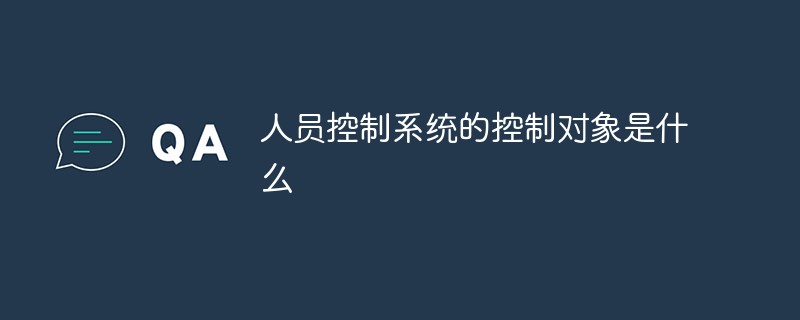The control object of the personnel control system is "employee behavior". Personnel control system refers to a system that uses interpersonal relationships and direct supervision of subordinate employees to control organizational performance behaviors. Because managers evaluate employee performance by observing and interpreting their behavior, personnel control is somewhat subjective.

The operating environment of this tutorial: Windows 7 system, Dell G3 computer.
The control object of the personnel control system is "employee behavior".
Personnel control system refers to a system that uses interpersonal relationships and direct supervision of subordinate employees to control organizational performance behaviors.
The personnel control system relies on superior managers to take direct supervision of individual employees and departmental behaviors, and employee and departmental behaviors need to be highly consistent with organizational goals. Because managers evaluate employee performance by observing and interpreting their behavior, personnel control is somewhat subjective.
Personnel control is usually applied to small businesses or to manage the relationship between superiors and subordinates within an organization. The characteristic of small enterprises is that their core managers have absolute power, and the key to successful personnel control is the charisma of core managers who can command subordinate employees who are absolutely loyal to the enterprise.
The personnel control system has many shortcomings. For example, excessive supervision causes employees to lose motivation and freedom, and there is a lack of objective performance evaluation mechanism.
Function:
- ##Equip suitable personnel for positions or tasks;
- Clear tasks and The person responsible for the deviation;
- Mobilize employee morale and improve employees' execution ability and self-control ability.
Main methods of personnel control
- Job evaluationTake workshop worker position evaluation as an example , general worker positions can be evaluated from 16 factors in four categories, record the time it takes for a workshop worker position to complete an operation, test it 5 times without affecting the employee's operation, remove the most and least, and still average Down, the normal production rhythm of the position is obtained. Workers in auxiliary positions will be tested on daily work content and time, and monthly work content and time.
- Position OptimizationAnalyze each production position, organize technical personnel to optimize the job content of the position based on relevant knowledge of industrial engineering, reduce non-value-added activities, and reduce production cycle time. Then form the actual production cycle time wall. The actual production takt time of the positions is averaged, the work content of the positions exceeding the average takt time is split and further optimized, and part of the content is split to the positions whose production takt time is lower than the average takt time. This reduces overall production cycle time and improves production efficiency. To improve production efficiency, the original three-shift positions can be turned into two shifts, and the two-shift positions can be optimized into one shift. When there are many orders, overtime can be appropriately handled.
- Staffing control: It is necessary to determine the personnel of each department and sub-branch based on job evaluation and optimization, production and sales volume, development and training plan Staff establishment, and then require each department and branch to recruit within the scope of the staff establishment, and clarify the recruitment time and reasons for recruitment.
- The concepts and methods of lean production can also be used for personnel control.
Notes
- Personnel control must be effectively linked to wages
- Human resources methods should be combined with lean production methods
For more related knowledge, please visit the
FAQ column!
The above is the detailed content of What is the control object of the personnel control system?. For more information, please follow other related articles on the PHP Chinese website!

